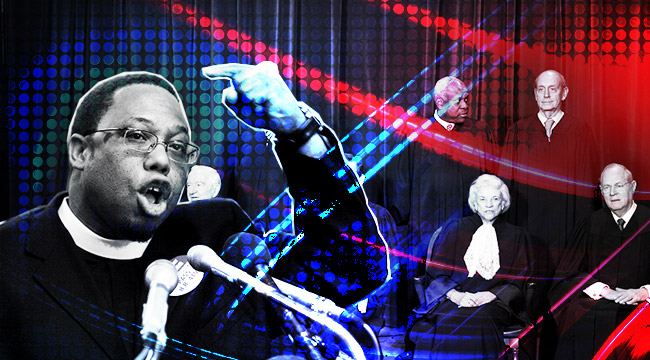
In 2013, the U.S. Supreme Court dealt a devastating blow to the 1965 Voting Rights Act with the Shelby County v. Holder ruling. The court found a centerpiece section of the act to be unconstitutional, which now makes it a lot easier for states to merrily tweak election procedures without federal preclearance. And many new state voting restrictions exist without the act’s full protection. With the third anniversary of this ruling, America sits in the unique position of observing its hellish effects on primary season while wondering how drastically it will affect the general election. What impact will we see upon affected communities, and is there anything citizens can do to quell the damage?
In search of answers, we spoke with Rev. Lennox Yearwood Jr., whose community activism knows few parallels. You may know Yearwood for his post-Hurricane Katrina work for survivors’ rights through the Gulf Coast Renewal campaign. He’s recognized by the White House as a Champion in Change. He founded the nonpartisan Hip Hop Caucus in 2004 and has partnered with many artists (including P. Diddy, T.I., and Vic Mensa) on community action issues including environmental justice, cannabis policy, and the Black Lives Matter movement. The organization’s Respect My Vote! campaign aims to re-strengthen the Voting Rights Act.
The Danger Of A Weakened Act On Election Season
Yearwood lists a number of concerns about Shelby v. Holder‘s effect on voting rights and voting discrimination. For example, states can now change polling locations without reason. This discourages voting through numerous access barriers, and communities can’t complain until after an election. Yearwood knows we’ve already seen damage during primary season and will see more in November. In Arizona, fewer polling booths caused long lines in many locations. New York and Arizona have seen reduced voting rolls, and Texas has tweaked its voter ID process in a way that Yearwood believes “raises suspicion.” To illustrate exactly what’s going on in the Lone Star State, just consider this — one can secure a voter ID by using a gun permit as a form of ID. But a student ID? That doesn’t fly.
Texas’ voter ID restrictions certainly affect millennials. Yearwood believes many new laws also target “elderly, disabled, and communities of color” by inhibiting access in similar ways. As Yearwood points out, the virtual dismantling of the Voting Rights Act allows “states which have historically — have some really bad history in regards to voting rights and voter suppression — it allows them to be in the position where they can change the law.” So, those affected by changes in election procedures will suffer. People and entire communities can start to feel like their voice means nothing. In short order, democracy itself gets shut down by way of a vanishing electorate.
Some Seriously Shady Supreme Court Logic
Moving back into the Shelby v. Holder discussion, Chief Justice Roberts made a curious claim while penning the majority opinion. He asserted that “things have changed dramatically” since the act’s passage in 1965. Yearwood sees things differently.
“I don’t agree with that,” he said. “I think that while some things have definitely improved, and we’re very happy, there are certainly things that have not improved. And if there’s anything that could limit voter participation, why would you want to test the process?”
Yearwood tells us that weakened voting rights support how “many people actually feel that cases of racism have become much more sophisticated.” So, the poll taxes of decades past have been replaced by fancy ID restrictions. And because many requirements are cost-prohibitive (my state charges $30+ for a driver’s license plus $20 for the birth certificate required as proof of identity), some form of poll taxing still exists. Other restrictions apply too. Several states still don’t allow ex-offenders to vote after rejoining society. For all these reasons, Yearwood continues, “I don’t agree with [Roberts’ assertion] at all. I think we have a long way to go. And the data shows that we clearly have a long way to go in making sure that everyone can vote and have a voice in this system.”
Chief Justice Roberts also placed the burden of changing the Voting Rights Act upon Congress. Does Yearwood have any confidence that this will happen in the near future? He laments how “It’s unfortunate that voting rights have become a partisan issue. That actually shows that the system is broken and needs to be fixed … something is really wrong.” He hopes “this Congress or the next Congress will do their duty” to inhibit voting restrictions and ensure rights for all.
Can The Voting Rights Act Be Saved?
This brings Yearwood to the immeasurable work done by the Hip Hop Caucus to engage young people in the political process.
“We want to make voting a lifestyle,” he said. “First step is to vote. And second step is to make sure they are part of the policymaking process. They don’t stop on election day, but they’re also engaging in policies that affect their communities. Everything from climate change, environmental justice, water in Flint, healthcare, education, jobs, economic security, and so we want to shape that.”
Yet these steps alone won’t work change. “The third part comes in with Shelby v. Holder. We want to make sure that vote matters. It doesn’t make any sense for us to do all this work, to get people to register to vote, and want to vote, and then their vote doesn’t count,” Yearwood concludes. “That’s why we want to move forward to broaden and strengthen the act.” He has more plans for the Hip Hop Caucus beyond election season, including a continued focus on civil rights along with healthcare and tax reform. To accomplish these goals, the population must engage, and the easiest way to do that is at the polls. This is why citizens must work to bring the Voting Rights Act back to life.
